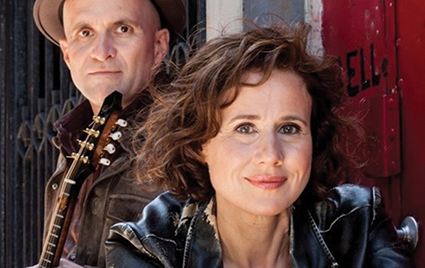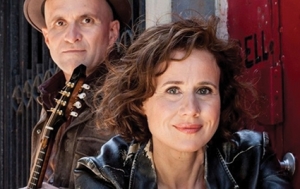Hearts Beating as One: Libby Skala on the 3 Amazing Women that Inspired Her
Libby Skala returned to the GIFT International Arts Festival in Tbilisi with her new show -Felicitas this week- telling the story of her aunt, a midwife who escaped the Nazi regime in Austria and immigrated to America to start a new life there.
Tell us how all of it started and why you decided to make a trilogy about your family?
Gary Austin inspired me, the way Mikhail Tumanishvili inspired Keti (Keti Dolidze - Georgian film and theater director and the founder of GIFT International Festival of Arts) and all of the other wonderful artists.
Austin is a teacher who travels and teaches improvisation, working with some of the greatest actors based on Del Close’s technique. He started the Groundlings Theater in Los Angeles. and came to Seattle to give workshops.
He had me do a special exercise talking to the class about someone I found interesting, compelling or fascinating. I spoke about my grandmother Lilia Skala who came from Vienna and was the first woman architect in Austria. I said nothing about her being an actress, I said simply that she was someone of a high social standard I suppose, and then, when Hitler came to power, she left for the US, without a penny to her name, and started work in a factory, knowing no English.
Each of her sisters came separately to the US, each having their own circumstances, but when they came they became a very close-knit family. When I first started writing the first show about my grandmother Lilia, it was really with the nurturing influence of this teacher Gary Austin, who, after I spoke for several minutes about my grandmother (again, nothing said about her being an actress and ending up as an Academy Award nominee), suggested that I write a one woman show about my grandmother.
So I wrote that show, performed it, and brought it to Tbilisi in 2006. In the meantime I wrote another one about the middle sister, the dancer, who was only sister still alive when I started writing the show about my grandmother. I interviewed her and had three audiotapes about their childhood. My great aunt would answer every question like: I don’t know about Lily, but I… it was all about her. After she passed away I made a play based on the stories she told me, supposedly about my grandmother.
The third sister was the total opposite, the midwife, Lizy. She was the midwife at my birth. She had a very busy nursing practice and never talked about her work because of confidentiality. She was a very private and quite person.
Wasn’t it challenging to tell such an intimate, personal story? How did you find a balance?
When I shared the most interesting aspects of the story for me with my family members, they asked me not to include them in the story. I felt a bit of conflict, because for me they were exactly the details that made the story interesting.
How did you come up the idea for a mono play?
When I first began it was difficult to hold the stage all by myself, but because I began in small segments, where I would maybe do just five minutes in the class, it was like a muscle. At first it was very difficult and sometimes if I wasn’t feeling energetic that day the performance would suffer, but as the play took off at full length, and after performing it hundreds of times, I now feel like the audience is my support, my scene partner. They are the ones that I talk to, the ones I feel there listening; I can feel them with me.
What is the message you want to deliver with your plays?
With Felicitas and all my other shows I feel that I’m telling the truth about life…About a person, about their struggles, how they see their lives, how they interpret them. I feel that somehow, in being so personal, it becomes universal. I feel that the audience takes away with Felicitas a little window into how we can get through our difficulties.
Tell us about the musical side of Felicitas
All I knew at the beginning was that I wanted to include music in the third play. Steve is a musician [Libby’s husband Steven May] and he’d never written music but he does improvisations. His primary instrument is violin and we thought we would try Felicitas with it, because the play begins in Vienna. But we found that my voice was very similar to the pitch of the violin and so we had to rethink- Steve would simply follow the emotional tune of the story and that’s how it evolved. People often told us afterwards that the music in Felicitas seems to represent the babies in the life of my great aunt.
What are your impressions of Tbilisi and GIFT?
Oh, there are so many changes since my last visit 10 years ago! Many new buildings, beautiful, just gorgeous! We’ve seen some amazing performances so far, from classical Georgian music to modern plays and King Lear from director Zura Getsadze which was so done so well here. Somehow, Keti Dolidze recognized the need to bring international artists together and although we all come from a different background and experience, when it comes to the arts it’s as though our hearts can beat as one.
Nino Gugunishvili











